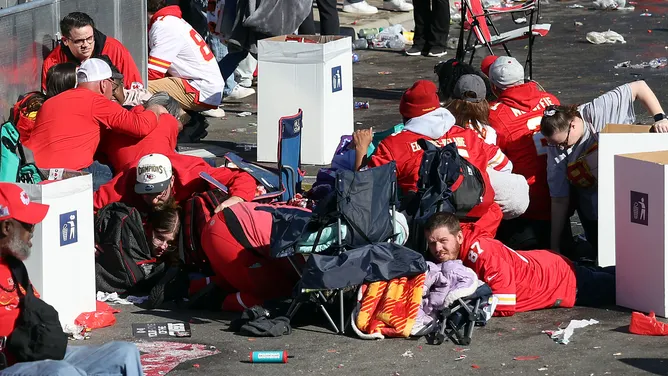The recent shooting incident at the Kansas City Chiefs’ Super Bowl victory parade has not only stirred public concern over gun violence but has also brought to light glaring flaws in media coverage of such tragic events. As details surrounding the shooting emerge, questions arise about the disparity in reporting standards and the underlying biases shaping the narrative.

The initial reports of the shooting, which claimed the life of a woman and left numerous others injured, underscored the urgency of addressing gun-related violence in America. However, subsequent developments in the investigation shed light on the media’s selective portrayal of perpetrators and their reluctance to adhere to ethical reporting standards.
One glaring discrepancy highlighted by the media is the differential treatment of suspects based on their race and background. While the names and identities of individuals involved in the shooting were promptly disclosed, including those of Lyndell Mays and Dominic Miller, the same transparency was not extended to “juveniles” involved in the incident. The reluctance to divulge information about these individuals raises questions about journalistic integrity and the ethical implications of shielding certain demographics from public scrutiny.
Furthermore, comparisons drawn between this incident and past cases, such as the high-profile trials of Kyle Rittenhouse and the controversy surrounding Nicholas Sandmann, underscore the media’s predisposition towards sensationalism and biased reporting. The swift condemnation and vilification of individuals like Rittenhouse, juxtaposed with the cautious approach to identifying suspects in the Kansas City shooting, reveal underlying biases and double standards prevalent in media coverage.
Moreover, the media’s tendency to politicize tragedies for ideological gain further undermines the integrity of journalistic practices. The rush to attribute motives and assign blame without comprehensive factual evidence reflects a disregard for the principles of impartiality and objectivity. Instances where mass shootings are exploited to advance preconceived narratives, such as advocating for stricter gun control measures or perpetuating stereotypes of white supremacy, undermine the credibility of media institutions and contribute to the polarization of public discourse.
In conclusion, the mishandling of the Kansas City shooting by the media underscores the pressing need for reform in journalistic practices. Upholding principles of transparency, accountability, and fairness is paramount in ensuring that tragedies are reported with integrity and empathy. By addressing inherent biases and adhering to ethical standards, the media can fulfill its role as a watchdog of democracy and facilitate informed public discourse on issues of national importance.

